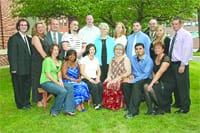Looking Into Foreign Nurses They Could Pose A Viable Option To Solve An Employment Shortfall
If your facility is experiencing a chronic shortage of nursing staff, as most in Western Mass. are, you may be thinking about hiring foreign nurses. But so many uncertainties plague the consideration. “Where do I start? What paperwork is involved? What are my responsibilities?” Immigration attorneys field these questions daily, and they can help you wade through the specific immigration-related forms and paperwork required.
Where do I start? How do I find foreign nurses? Unless your facility has the means to dedicate a full-time foreign-nurse recruiter to the project, hospitals often work with a reputable recruiter familiar with the process of locating qualified foreign nurses. This is often the best use of time and funds.
This specialized recruiter will generally have sources or contacts in foreign countries where an abundance of nurses are located — nurses who want to work in the U.S. As a part of the service package, a recruiter may arrange for recruitment ads to run in newspapers or conduct job fairs to inform nurses about your facility, as well as salary and benefits packages. The recruiter may also offer an overall orientation about immigrating to the U.S., as well as arrange interviews.
How do I interview someone halfway around the world? It’s usually hospitals’ policy to conduct personal interviews with all potential employees, so this is one of the first issues that confront the hospital’s human resources department. It’s obviously not cost-effective to fly each of the nursing candidates to the U.S. for an interview. A popular option is for a human resources representative to screen resumes, then travel to a location where a recruiter has arranged to have several nurses available for an informational fair or individual interviews. Alternately, the representative may be comfortable with a phone interview, which can also be coordinated by the recruiter.
How can I be sure they are who they say they are and that their credentials are real? Due to stringent requirements for filing immigration paperwork, each nurse will be required to prove the validity of their nursing credentials. This system was created to protect the American patients whom the nurse will eventually serve; however, this requirement also protects employers from hiring a nurse with fraudulent credentials.
The Commission on Graduates of Foreign Nursing Schools (CGFNS) was established in the late 1960s to protect the public by ensuring that nurses educated in countries other than the United States are eligible and qualified to meet licensure and other practice requirements in the U.S. CGFNS provides products and services that validate credentials and enhance international regulatory and educational standards for health care professionals.
When a nurse has passed the CGFNS exam, the employer can be sure that their credentials are valid, their education is equivalent to a nursing education given in the U.S., and their chances of passing additional licensing exams are substantially increased. Most foreign nurses who plan to work in the U.S. already know that passing the CGFNS exam will be required.
Once you have come to an employment agreement with the nurse, you must prepare and file labor certification forms with the U.S. Department of Labor (DOL) and, following DOL approval, immigration forms with the U.S. Citizenship and Immigration Service (USCIS), formerly known as the INS. Assuming the nurse is located outside the United States, the final visa processing will then begin at the U.S. consulate, or embassy, in the nurse’s country of origin.
Upon entry into the United States, the nurse will arrive as either an intending immigrant or a temporary worker. Filing him or her as an intending immigrant is recommended, as it means he or she will be granted an employment-based green card.
You may have heard about the H-1B visa and wonder how it applies to foreign nurses. The H-1B visa category is strictly for professions that require a bachelor’s degree. However, because the RN profession in the U.S. does not require a bachelor’s degree, this profession is not eligible for that classification. A green card will take more time than the H-1B visa to acquire and implement, but it will be less cumbersome to maintain than the H-1B visa, and it provides the additional benefit of an unlimited amount of time that the nurse will be eligible to work for you in the U.S.
Immigration processing is notoriously slow and frustrating to both the employer and prospective employee. On a good note, however, the DOL has found the professions of registered nurse and physical therapist to be in chronic shortage in the U.S. These two professions are considered pre-certified and fall into a group called Schedule A, which allows the employer to skip the cumbersome, lengthy, and costly process of labor certification.
Generally speaking, the only advertising requirement imposed by the DOL for these positions is an internal posting which notifies others in your organization that you are hiring for this particular position in connection with an immigrant visa.
How long will it be before the nurse can start employment? There are a few variables that affect speed of employment start. The highlights include the physical location of the work site in the U.S., the nurse’s nationality, and the nurse’s location come interview time.
A good estimate is that the nurse should be knocking on your door in 18 to 24 months, giving time for Phase I to process in the U.S. (6 to 12 months), and the consulate abroad to finish Phase II (6 to 12 months).
This amount of time can sometimes discourage employers from proceeding altogether. Nevertheless, the nurse staffing shortage probably won’t be any better in two years than it is now, and setting the wheels in motion for a pipeline of foreign nurses may be worth the effort.
What are my responsibilities to the nurse once employment begins? When a facility sponsors a nurse for permanent residency, the following employer responsibilities are assumed:
• The hospital must provide full-time, permanent employment. ‘Permanent’ means the same as for any offer of employment — without a fixed termination point or indefinite;
• The facility must be able to pay the nurse’s salary, at a minimum of 95{06cf2b9696b159f874511d23dbc893eb1ac83014175ed30550cfff22781411e5} of the prevailing wage paid to other nurses in the geographic region, and it must be willing to prove its ability to pay this salary; and
• The facility must show a genuine intent to undertake the employment relationship and be ready to confirm the intent in writing.
What if the nurse seeks employment elsewhere after arrival? As long as the employer has fulfilled all their responsibilities as outlined above, the nurse is obligated to work ‘permanently’ for the employer, just as the hospital must show a real intent to undertake the employment relationship confirmed in writing by signing the immigration processing forms. It is recommended to require the nurse to sign an employment contract or agreement for a period of no less than six months in return for sponsoring his or her immigrant visa. A customary period of time for employment under these conditions is 12 to 24 months.
Who pays for all this immigration processing? There are several options for payment that can usually be agreed upon between you, the nurse, and your recruiter. Because the process takes so long, it’s not uncommon for the facility to require that the nurse pay the cost of the immigration process at least until he or she arrives and has worked for a period of time.
It is also a customary practice to reimburse the nurse, after a pre-determined period of employment, for all or most of the processing fee as an employment bonus. However, when working with a recruiter, the cost for the immigration processing is often included in the recruiter’s fee.
The nursing shortage in the United States continues to worsen. Meanwhile, many qualified foreign nurses who are graduating from foreign nursing schools have far fewer employment options available in their home countries. These eager young men and women are often anxious to begin their careers in the United States. By undertaking the process described above, both the employer and employee may find themselves in a true win-win situation.
Martin C. Dunn, Esq. is an associate with Bacon & Wilson, P.C. He is a general practitioner who possesses expertise in the areas of immigration law, commercial business transactions, and landlord/tenant law. He can be reached at (413) 781-0560 or at mdunn@bacon-wilson.com.



Comments are closed.